In Japanese, using your own name as first person pronoun is something that very young children do, and that some people in real life, and some anime characters, do in order to appears more childish, sillier, and cuter. Specially girls.
Grammar
Grammatically, a pronoun is a word that's able to refer to a given thing without referring to the thing by its name. Personal pronouns refer to people: I, you, him, her.
Given the definition above, when names are used as pronouns, the word for one's name doesn't BECOME a pronoun—it's a proper noun—rather, the word for one's name is used INSTEAD OF a pronoun.
- (own name) wa piza tabetai
〇〇はピザ食べたい
(Own name) wants to eat pizza. - watashi wa piza tabetai
私はピザ食べたい
I want to eat pizza.
In pages that contain information about anime characters, for example, if a character uses their own name instead of a pronoun, it will something like this:
Presumably, this happens because nobody really cares if it's a pronoun or not.
I mean, if we really want to be extra pedantic: ichininshou literally means "how you call the first person," i.e. how do you refer to yourself in a sentence. The word "pronoun" would be daimeishi 代名詞, so just ichininshou alone isn't necessarily a pronoun, though it normally is.
- ichininshou daimeishi
一人称代名詞
First person pronoun.
The author wants to note that when the author writes "the author," that's also not a pronoun, it's noun, even though it's used instead of "I," which is a pronoun.
For reference, some examples:
- Context: Koiwai Yotsuba 小岩井四葉 tries to catch a cicada.
- totaaa~~!!
とったぁー!!
[I] caught [it]!! - {Yotsuba ga totta} semi da!!
よつばがとったセミだ!!
[This] is a cicada [that] {Yotsuba caught}!!
- In other words:
- {watashi ga totta} semi da
私が捕った蝉だ
[This] is the cicada [that] {I caught}.
- Context: Hina-Ichigo 雛苺 pouts.
- .........
- Hina φ warukunai mon
ヒナ悪くないもん
"Hina isn't bad." (literally.)
It isn't Hina's fault.- In other words:
- watashi wa warukunai
私は悪くない
"I am not bad."
It isn't my fault. - mon もん - contraction of mono もの and sentence-ending particle often used by children.
Usage by Children
The reason why small children use their own names as first person pronoun has to do psychology, specifically the language development: how the manner which parents speak to babies in Japanese culture affects the child's understanding of self.
In Japan, normally you'd refer to people by names rather than by pronouns, however, when talking to one's child, the parent refers to family members from the perspective of the child.
For example, say you're the father of a 2 year old boy called Tarou.
You'd refer to Tarou as Tarou.
In front of Tarou, you'd refer to:
- Yourself as "daddy," papa パパ.
- Your wife as "mommy," mama ママ.
- Your father as "grandpa," jiichan じいちゃん.
- Your mother as "grandma," baachan ばあちゃん.
Note that the diminutive ~chan ~ちゃん honorific suffix tends to be used when talking to children.
This is all in order to teach Tarou how to call his family. You want him to call you "daddy," so you call yourself "daddy" in order for him to learn to call you "daddy," too. You call your wife "mommy," so he calls her "mommy," too. And so on.
The side-effect of this is that, since you call Tarou by his own name, Tarou will start referring to himself by his own name, too.
The child doesn't have the level of intelligence to know the difference between Tarou and papa. For him, both words are names. He's called Tarou, and his father is called papa. The concept of personal pronouns and aliases is foreign for the child.
- Alternatively, in some cases the child gets the that their name is a second person pronoun. For example:
- Tarou sees his father calling himself papa, and calling him Tarou.
- Tarou copies this.
- Tarou calls himself papa, and call his father Tarou, because he thinks papa means "I" and Tarou means "you.".
As the child grows up, he'll start interacting with people outside his immediate family, and seeing his parents talk to other people, too, and he'll eventually realize people have their own names as well as aliases.
Then he'll start using a first person pronoun, too, like boku 僕, or ore 俺, copying whatever other people use, or whatever his favorite cartoon character uses.
For reference, I'll include the raw data here from a study that surveyed the usage of first person pronouns by Japanese children. Besides boku and ore, it reports watashi, mainly used by girls, and a few children using washi わし and uchi うち.
| Age in Years | ||||||||
|---|---|---|---|---|---|---|---|---|
| Alias | 2 | 3 | 4 | 5 | 6 | 7 | 8 | 9 |
| Boys, toward parents. | ||||||||
| Name + ~chan | 4 | 4 | 5 | 2 | 1 | 1 | 0 | 1 |
| Name | 7 | 1 | 5 | 0 | 0 | 1 | 1 | 0 |
| boku | 0 | 2 | 4 | 4 | 8 | 4 | 6 | 6 |
| ore | 0 | 3 | 5 | 5 | 5 | 2 | 1 | 1 |
| watashi | 0 | 1 | 0 | 0 | 0 | 0 | 0 | 0 |
| washi | 0 | 1 | 0 | 0 | 0 | 0 | 0 | 1 |
| Boys, toward friends, younger siblings. | ||||||||
| Name + ~chan | 2 | 0 | 4 | 1 | 1 | 0 | 0 | 0 |
| Name | 2 | 0 | 2 | 0 | 0 | 0 | 1 | 0 |
| boku | 0 | 0 | 2 | 1 | 5 | 1 | 1 | 2 |
| ore | 0 | 2 | 4 | 4 | 4 | 5 | 6 | 3 |
| washi | 0 | 0 | 0 | 0 | 0 | 0 | 0 | 1 |
| Girls, toward parents. | ||||||||
| Name + ~chan | 2 | 5 | 4 | 8 | 1 | 2 | 1 | 1 |
| Name | 8 | 6 | 0 | 6 | 5 | 2 | 2 | 1 |
| boku | 0 | 0 | 0 | 0 | 2 | 0 | 0 | 0 |
| ore | 0 | 0 | 0 | 0 | 1 | 0 | 0 | 0 |
| watashi | 0 | 2 | 3 | 0 | 1 | 3 | 2 | 0 |
| uchi | 0 | 0 | 0 | 0 | 0 | 1 | 0 | 0 |
| Girls, toward friends, younger siblings. | ||||||||
| Name + ~chan | 0 | 5 | 3 | 4 | 2 | 0 | 1 | 1 |
| Name | 3 | 5 | 0 | 4 | 3 | 1 | 1 | 0 |
| boku | 1 | 0 | 0 | 0 | 0 | 0 | 0 | 0 |
| ore | 0 | 0 | 0 | 0 | 1 | 0 | 0 | 0 |
| watashi | 1 | 1 | 3 | 0 | 2 | 6 | 2 | 1 |
| uchi | 0 | 0 | 0 | 0 | 0 | 1 | 0 | 0 |
The data above confirms what's well-known: girls use watashi, while boys use ore and boku. On top of that, children are more likely to use their own name when talking to their own parents, and boys are quicker to stop using their own name as pronoun compared to girls.
A possible reason for this is the lack of need to use the pronoun watashi.
Parents tell boys to use boku, so they end up being told to use pronouns quicker than girls. The pronoun ore is more assertive, and boys tend to use it to look cool in front of their friends.
Girls wouldn't use these male pronouns, the only normal pronoun for them is watashi, and watashi only has a formal nuance, which children wouldn't need.
Consequently, girls end up not changing to watashi until their routine starts demanding it, e.g. when they have to go to middle school, high school, and the increasing formality pressures them into using it.
- Context: Akaza Akari 赤座あかり, a 13 years old girl, regrets not being 14 years old like her friends, because they started middle school one year before her, so she spent a whole year without going to school with them.
- aaa...
あーあ・・・
Aah... (sigh.) - Akari ga {mou ichinen hayaku} umaretetara dougakunen datta noni
あかりがもう一年早く生まれてたら同学生だったのに
If Akari had been born {one year sooner} [we] would have been in the same year of school.
- umaretetara - contraction of umarete-itara 生まれていたら.
- umaretetara - contraction of umarete-itara 生まれていたら.
- Akaza Akari (juu-san)
赤座あかり(13)
Akaza Akari (thirteen).- In Japanese, a number inside parentheses after someone's name typically indicates their age.
- The family name (Akaza) comes before the given name (Akari), opposite to the name ordering in America, for example.
Cutesy Usage
Teenagers, adults, in real life and in anime, also sometimes use their own name as first person pronoun. It's mostly girls that do this.
That's because it's cute. And it's cute because it's silly. And it's silly because it's something little children would say.
Conversely, one can also say it sounds pretty dumb to speak in what's basically baby-talk, and that that's extremely cringe, specially if you're an adult. After all, nobody can take you seriously if you speak like this.
- Context: Mutsumi 睦美 says why she's frustrated.
- datte... minna ijimeru shi, mushi suru shi'...
だって・・・みんなイジメるし無視するしっ・・・
Because... everybody bullies [me], ignores [me]... - Mutsumi φ, nanimo {warui} koto shitenai noni!
睦美 なにも悪いことしてないのに!
Even though Mutsumi did nothing wrong! - ichininshou ga namae tte no ga shara-kusee
一人称が名前ってのがしゃらくせぇ
[Using] [your] name as first person pronoun feels cheeky.- shara-kusee - contraction of shara-kusai 洒落臭い, literally "reeking of impertinence," as in it seems like it's cheeky, impudent, from how it looks.
- Yato-san kuuki wo!!
夜トさん空気を!!
Yato-san, read the [air]!!
- kuuki yome
空気読め
Read the air. (literally.)
Read the room. Pay attention to social cues. (used here because the girl was crying frustrated and he just threw a sharp jab on her behavior.)
- kuuki yome
In anime, it tends to be more common because it's not real-life, so nobody bats an eye a character doing this sort of stuff. The same applies to idols, who're basically playing a cute character.
In either case, since the point is being cute, it's mostly girls that do this, not guys.
- In Re:Zero kara Hajimeru Isekai Seikatsu Re:ゼロから始める異世界生活, both of the maid sisters Ram ラム and Rem レム use their own names as first person pronoun.
Using one's own name as pronoun can also be perceived as a deliberate attempt to present oneself as cute, which may feel kinda forced sometimes, specially if we're talking about adults.
If someone is speaking like a toddler by using their own name as pronoun, they'll probably also use other silly speech mannerisms which you could call cute or cringe.
For example, using diminutives everywhere, like ~chan ~ちゃん instead of ~san ~さん, and giving cutesy nicknames to all sorts of things.
Nickname as Pronoun
In some cases, the character uses a cutesy nickname instead of their own name as pronoun, sometimes with ~chan included. This is the opposite of an ore-sama 俺様 character: ore-sama adds an honorific to yourself, while own name-chan makes yourself diminutive.
- In Re:Zero, Felix Argyle フェリックス・アーガイル, a boy that looks like a girl, uses Feri-chan フェリちゃん as first person pronoun.
Slow Characters
In some cases, an anime tries to make a character moe 萌え by making them very, very slow intellectually. Seriously, it's kind of disturbing how they sound either mentally disabled or intoxicated all the time.
- See K-on! けいおん! for an example of this.
Presumably, this is done because a character that you want to protect is moe, but a character will never need to be protected if they're sufficiently independent.
To make the character moe, then, you have to design them in such way she depends on someone in order to live, and the audience wants to be that someone.
The character is aggressively dumb to cause worry: what's going to happen to her if I'm not around to help? How will she live without me?
- In Jashin-chan Dropkick 邪神ちゃんドロップキック, Jashin-chan is an awful
human beingthousands years old demon, who is always doing evil, heartless things. She leeches off Medusa メデューサ, asking for money all the time. Medusa interprets this as her being needed by Jashin-chan, well, needed for her money, and as such she feels Jashin-chan couldn't live without her. Although mostly unrelated to this article, this is another application of the same idea.
Such slow characters also end up having their own name as first person pronoun, since that sounds slow as well.
- In Steins;Gate, Shiina Mayuri 椎名まゆり uses Mayushii まゆしぃ as first person pronoun, which is a cutesy nickname for herself.
Infantilism
It's also possible that a character isn't using their name as first person pronoun to look cute, but because they have the mental age of an infant due to some medical or psychological issues in their mental development.
Alternatively, it could be someone pretending to have a mental age of an infant, because that's somebody's fetish.
- alachan-gaeri
赤ちゃん返り
Returning to baby. (literally.)
Acting like a baby, using slurred speech, etc., in spite of not being a baby anymore.
Mental Age Regression
If a character happens to have their mental age regress to a toddler's age, it's possible that they'll use their own name as first person pronoun, as well as speak like a toddler in general.
- youji ikou
幼児退行
Infantile regression. (medical term.)
In Result to Trauma
In some dark series, like Berserk, a character may regress in mental age as result of a trauma, great psychological shock, stemming from fear, hopelessness, abuse, torture, etc.
This is said to be a coping mechanism, but in real life it seems the case is for young children to revert to babies, and stop doing things they had learned to do already, like going to the toilet alone, rather than for adults to revert to babies, which is kind of a much larger distance in years.
Well, I'm not a psychiatrist, so I wouldn't for sure how this works, but neither is the manga artist, so they wouldn't know either. In any case, such character may use their name as first person pronoun, along with other childish mannerisms.
Usage with Kono この
Sometimes, a person will say kono この, "this," and their own name in order to emphasize a statement is about them, and not anyone else.
This usage has no childish nuance in it.
Instead, it's often arrogant, as the person thinks of themselves as being special somehow compared to others.
See kono ore da! この俺だ! for details.
One example:
- Context: Nappa ナッパ talks to Kakarot カカロット.
- {temee nanka ga
kono Nappa-sama ni
kanau} wake ga nai-n-da!!!
てめえなんかがこのナッパさまにかなうわけがないんだ!!!
[There's no way] {[someone like] you [can defeat] THIS NAPPA-SAMA}!!!- kanau 叶う - means "to rival" sometimes, as in, "can defeat," since someone unrivaled is undefeatable.
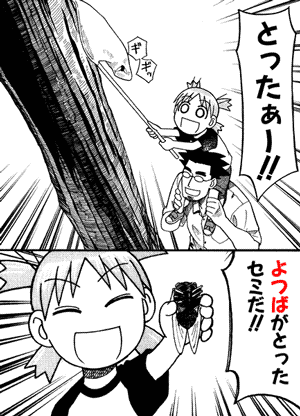
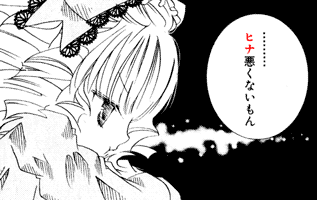
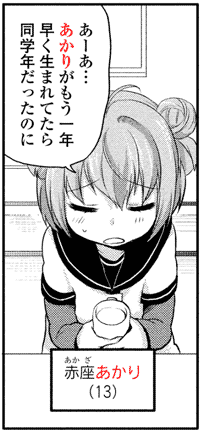
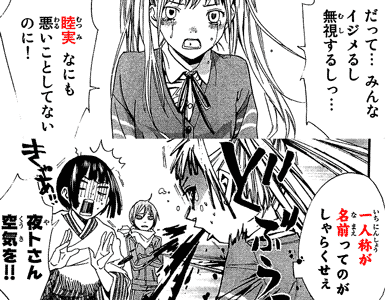
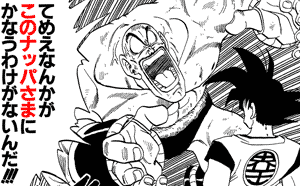
No comments: